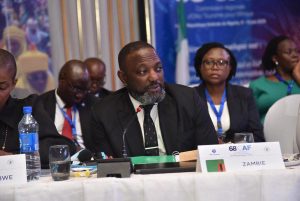Zambia Celebrates Independence Day: A Reflection on 60 Years of Freedom and Progress
October 24th marks a significant day in Zambia’s history, as the nation celebrates its 60th Independence Day. Since gaining independence from British colonial rule in 1964, Zambia has journeyed through six decades of political, social, and economic development. This milestone provides an opportunity to reflect on the achievements of the past, the challenges of the present, and the aspirations for the future.
A Historic Struggle for Freedom
Zambia’s road to independence was shaped by a long struggle for self-determination. Under the leadership of the country’s founding father, Dr. Kenneth Kaunda, and his allies in the independence movement, Zambia achieved freedom from colonial rule on October 24, 1964. The newly independent nation adopted the motto “One Zambia, One Nation,” signifying unity in the face of the diversity of its 72 ethnic groups.
Dr. Kaunda’s leadership was instrumental in shaping post-colonial Zambia. His government promoted a vision of unity, peace, and development, laying the groundwork for Zambia’s future as a democratic and peaceful nation. Though Zambia faced early challenges, including economic difficulties and regional instability, the spirit of unity helped to maintain internal peace and cohesion.
Sixty Years of Progress
Over the past six decades, Zambia has made notable strides in key areas, including education, healthcare, and infrastructure development. Education has been a cornerstone of the country’s progress, with significant investments in building schools, colleges, and universities. Today, Zambian children have access to free primary education, a step toward addressing literacy and promoting national development.
In healthcare, Zambia has expanded access to medical services, building hospitals and clinics across the country. The fight against diseases such as HIV/AIDS, malaria, and tuberculosis has been a priority, and the country has made significant progress in improving health outcomes and life expectancy.
Infrastructure development has also been a key focus of successive governments. Zambia’s road network, once limited and underdeveloped, has expanded significantly, facilitating better trade and transportation within the country and with neighboring nations. This development has contributed to economic growth, particularly in sectors such as agriculture, mining, and tourism.
Economic Growth and Challenges
Zambia’s economy has grown steadily since independence, largely driven by the mining sector. The country is one of the largest producers of copper in Africa, and mining remains a key contributor to its GDP. However, Zambia’s dependence on copper has also made its economy vulnerable to fluctuations in global commodity prices. Diversifying the economy remains a priority to ensure long-term sustainability.
The country has also faced economic challenges, including high levels of debt, unemployment, and poverty. Despite these challenges, Zambia continues to work toward achieving the United Nations’ Sustainable Development Goals (SDGs), with a focus on poverty reduction, education, gender equality, and climate action.
Democracy and Good Governance
One of Zambia’s proudest achievements since independence is its commitment to democracy and good governance. Zambia has experienced peaceful transitions of power between different political parties, a rarity in many parts of Africa. Its democratic institutions, including the judiciary and electoral commission, have maintained relative stability and integrity.
The peaceful transfer of power in the 2021 elections, when President Hakainde Hichilema was elected, underscored Zambia’s democratic maturity. President Hichilema’s government has prioritized economic reform, anti-corruption measures, and debt restructuring, signaling a new chapter in Zambia’s governance and development journey.
Looking Forward: The Road Ahead
As Zambia celebrates 60 years of independence, the country stands at a crossroads. While much has been achieved, much remains to be done. The challenges of economic inequality, climate change, and youth unemployment require urgent attention. Zambia’s young population is its greatest asset, and investments in education, technology, and entrepreneurship will be critical in harnessing this potential.
The future of Zambia depends on building an inclusive and sustainable economy that benefits all citizens. Diversification into sectors such as agriculture, manufacturing, and renewable energy will help reduce dependency on copper and create jobs. Additionally, Zambia’s rich cultural heritage and natural beauty offer significant opportunities in the tourism industry.
Conclusion
Zambia’s 60th Independence Day is a time to reflect on the nation’s journey from colonial rule to a democratic and peaceful country. It is a moment to honor the sacrifices of those who fought for freedom and to celebrate the progress made in education, healthcare, infrastructure, and governance. While challenges remain, Zambia’s resilience, unity, and commitment to progress offer hope for a brighter future.
As the country looks ahead to the next 60 years, the values of independence—freedom, unity, and prosperity for all—continue to guide Zambia’s vision for a better tomorrow.
Happy Independence Day, Zambia! One Zambia, One Nation!

